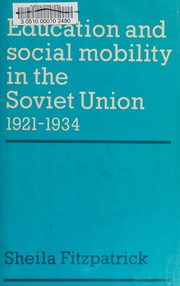
Education and Social Mobility in the Soviet Union, 1921-1934
References and Quotes
Quote
Used in: The Dang'an
Teachers were, for the most part, completely bewildered. The primary-school teachers knew how to teach reading, writing and arithmetic, but they had never heard of Dewey, never read Marx, and had absolutely no idea of what the GUS methodologists were talking about. Narkompros had provided them with three headings (Nature, Labour, Society), and a number of suggested themes (‘Man’, “The Steamboat as a Form of Transportation’, “Sheep’, ‘Successes of Agriculture’, ‘Day of the Female Worker’, ‘First of May’, etc.) which were extremely difficult to fit into any logical sequence. The teachers had also been told that the school should abandon academic for activity methods, but they did not really know what these were — not surprisingly, since it was a question hotly debated in Narkompros itself. (p. 34)
Quote
Used in: The Dang'an
Schoolchildren and their parents were also unhappy with the progressive school. Peasants complained that the school was not carrying out its basic function of teaching children to read, write and count: growing vegetables and breeding rabbits, the peasants reasoned, was something they could teach their children themselves and was not the business of the school. A letter in the teachers’ newspaper noted that ‘children, under the influence of their elders, are demanding that we do more work with them on arithmetic, writing, reading and so on. They work willingly on these subjects, and grumble when we work with them through any of the GUS themes. We are boring the pupil with monotonous material.’ (p. 48)
Quote
Used in: The Dang'an
industry remained relatively satisfied with its VTUZy until after the summer of 1931, when the first large batch of First Five-Year Plan engineering students (including the first of the Thousanders) graduated. This satisfaction was quickly dispelled in the following months, as a stream of complaints came in about the quality of the new engineers. One type of complaint — coming from the young engineers themselves, and strongly supported by the former professors — was that they lacked basic theoretical grounding in such subjects as mechanics, physics and mathematics. The other type, coming from the enterprises, was that the graduates lacked ‘production skills’. This came as a particular shock, considering the 1:1 ratio established in the VTUZy between theoretical and practical work. (p. 231)